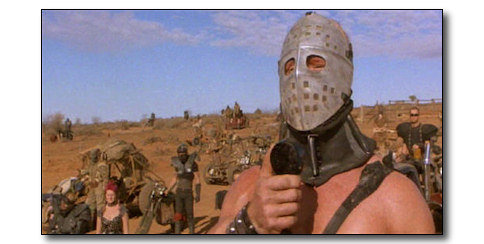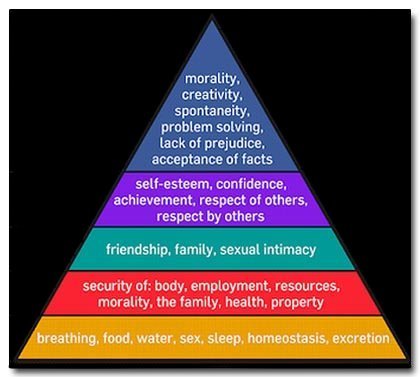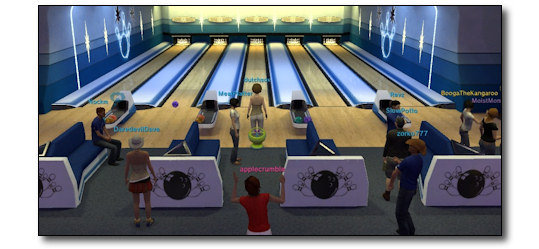5 Reasons The Future Will Be Ruled By B.S.

Picture your ideal future. OK, not your ideal future, where you're the last man on earth fighting the zombie horde, but society's ideal future: Energy is clean and limitless, goods are plentiful and machines take care of all the dirty work. So everybody's happy, right?
But in many ways, that future is already here, and it can be described in five letters:
FARTS.
I should probably explain.
A Star Trek-Style Utopia is Already Here ... Sort Of

Let's talk about porn and dead babies for a moment.
If I gave you a budget of zero dollars and said, "Get me as much Internet porn as you can for that amount of money," how much porn would you come back with?
I'm thinking the answer is, "All of the porn."

That credit card is to order extra Scotchgard.
Which brings me to an amusing story. In the last few decades, thousands of babies in Third World countries have died from contaminated baby formula. Wait, did I say amusing? I typed the wrong word there. Anyway, what happens is the mothers mix the baby formula with contaminated water, because sanitation is poor. So why the hell do the mothers feed their infants poison formula when they can just produce milk, for free, from their own bodies? The answer is that they do it because the manufacturer of the formula, Nestle, ran lots of ads telling them to.
If you want to know what the future looks like, there it is. The future is going to hang on whether or not businesses will be able to convince you to pay money for things you can otherwise get for free.
Some of you think I'm about to talk about file sharing and DRM and the evil record labels. But that's just a teaser of what's coming. The world has changed. All the rules we were trained to believe about society from birth until now are about to go out the window.

One way or the other.
Futurists and sci-fi writers talk about a "post-scarcity" society, meaning it's like Star Trek, where matter replicators and fusion reactors have ended all shortages. On one hand, that now looks like a ridiculous pipe dream, but in a lot of areas of our life, we're already there. Think about the porn. There's more porn than air now. Literally -- air is limited, but we have machines that can convert energy into .jpegs of titties from now until the heat death of the universe. Titties are post-scarcity.

Huzzah!
Now think about how many people you know who live in apartments or trailers barely big enough to host a game of Twister but who don't care because they spend every waking moment at home either playing World of Warcraft or surfing the Internet. They're not looking for a two-story house with a swimming pool and a white picket fence. With a $300 netbook and a $20-a-month Internet connection they can connect with friends, meet girls, get their entertainment, pursue their hobbies and stay in contact with family or co-workers. They may even work from home.
Look at how many of Maslow's Hierarchy of Needs they're getting digitally:

Everything from that second tier to the capstone, they can get at a cost that rounds down to zero, if they so choose.
We Internet types are so busy haggling over video games with DRM that we're not grasping the scale of this. We're like a dog who's been cooped up behind a fence his whole life, and now a storm has knocked down the gate. The dog looks out and thinks, "Wow, out there is the front yard!"
No, Fluffy. Out there is the whole world.
To Stay Afloat, Businesses Have to Pretend Unlimited Goods are Limited

Well, shit, Utopia's here! Mankind won! Let's just stop reading the article here and go celebrate!

House music and MDMA for everyone!
Wait -- did you forget the thing about the baby formula?
Because this is where shit gets absurd. For instance:
Public libraries have been lending out books to people, for free, for the last 500 years or so. Publishers are OK with it because the library is paying for the book, and if it's a popular book, they'll buy multiple copies so multiple people can check it out at once. Then they'll replace those every couple of years, because if you read a book too much it falls apart at the binding.
But then the publisher invented a better book. An indestructible book called an ebook that could be read 10 billion times without ever falling apart. How much does it cost to manufacture this marvel? Not a goddamned penny. The readers have the ability to "manufacture" copies of their own, on their computer, at no cost to the publisher. It's a post-scarcity book.

So for the publishers, the next step was clear: Make the book destroy itself.
An ebook sold to a library will thus delete itself out of existence after a year, or after X number of times it had been lent out. This is a big source of controversy between publishers and public libraries, maybe because both of them know they've found the loose thread that can unravel all of society. After all:
A. Why can't the library just buy as many digital copies as are needed for the customers, and keep them forever, if they don't naturally degrade?
B. Wait a second. It's just a digital file. Why not just buy one copy, and just copy and paste it for every customer who wants to read it?
C. Wait a second. Why do you need the library at all? Why can't a customer just buy a copy from the publisher and "lend" copies to all of his friends?
D. Wait a second. If no printing and binding needs to be done, why do you need the publisher? Just buy it directly from the author.
E. Waaaaait a second. Why buy it? Once the author makes one copy available, why can't everyone just grab it for free?
Stop and think about everything that just vanished there. Skyscrapers full of publishing company employees, warehouses full of books, book stores, libraries, factories full of printing presses, paper mills, all the stuff the author bought with his writing money. Gone.

"Fuckers!"
To keep all that stuff up and running, the publisher is resorting to what experts call FARTS--Forced ARTificial Scarcity. Or they would call it that, if they were as awesome at naming things as I am.
Mark my words: The future will be ruled by FARTS.
Remember the debut of Sony's futuristic Matrix-style virtual world, PlayStation Home? There was a striking moment when the guys at Penny Arcade logged in and found themselves in a virtual bowling alley... standing in line. Waiting for a lane to open up. In a virtual world where the bowling alley didn't actually exist. It's all just ones and zeros on a server--the bowling lanes should be effectively infinite, but where there should have been thousands of lanes for anybody who wanted one, there was only FARTS.

Get used to it.
Arbitrary Restriction of Goods Is the Future

It works the same way with all digital goods -- from entertainment to communication to the software you use to do your job. A significant chunk of our economy runs on FARTS now. And as time goes on, more and more of what we use and rely on day to day will be enveloped by that invisible cloud.
Awesome, right? After all, you're not going to do what the Man tells you to do. You're not going to tolerate a future where corporations try to slap a price tag on readily available goods. It'd be like -- I don't know -- making a woman pay huge amounts of money for something that could be accomplished with her own bodily fluids.

Or spending money on candles when you have perfectly good earwax.
That's what I thought, too. I'm savvy. I'm savvy as balls. But then I looked around my desk.
Sitting next to me is a bottle of Aquafina water. It's there because in the 1990s, both Pepsi and Coke noticed cola sales were flat, so they bought tap water -- the same stuff I have an effectively infinite supply of -- stuck it in bottles, put a picture of a mountain on the label and upped the price by 20,000 percent. Then I paid for it.

Capitalism. Because spending is easier than thinking.
Next to the water is a green bottle of Excedrin. Sure, the generic store brand is identical right down to the molecule, but I paid twice as much for the name brand because this is Excedrin here. The Headache Medicine. It's sitting on top of a statement from the bank showing where they automatically deducted my mortgage payment... for a $5.00 "transaction fee."
And man, don't even look at my PC. I have on it a copy of Windows 7 -- a $200 full copy, because I was installing it on a new hard drive. The upgrade version is only $100, and by the way, they're the exact same product -- all the data is on both disks. The cheap one just has a thing that detects whether you have a previous version of Windows on the drive and refuses to install if you don't.

For an extra $20, they'll throw in an animated cut-scene of Clippy being crucified.
When I go to upgrade this computer, maybe I'll wind up with that new processor Intel is test-marketing, which ships with software that intentionally disables some of the chip's features. Why? Because along with it they sell a $50 "upgrade card" that does nothing but unlock the capabilities the processor had all along.
They've been training us to pay for nothing, and we're all going along with it. Tell me I won't find any FARTS at your desk.
The Future Will Turn Us All Into Lars Ulrich

I picked the example with the ebooks earlier for a reason. As I mention every chance I get, I have a book on store shelves, a novel about monsters and dongs. It's in paperback now at the reasonable price of $10 or so. It took me five years to write it. But let's face it: If you want a digital copy of it for free, you can get it. The scarcity that would require you to pay money is purely a product of our collective imagination. John Dies at the End is 350 pages of FARTS.

Also, the binding glue causes leukemia.
This is the basis of that huge fight between Amazon.com and the largest book publisher about ebook prices. Nobody knows what to charge. We just kind of have to arbitrarily decide, because after the first copy, it costs nothing to make them.
Meanwhile me, my family, the bank what owns my mortgage and car loan, the IRS, the grocery store where I buy my food, all are hoping the same thing -- that you won't notice that free copies of my book are floating all around you. Soon, the whole world will be nursing the same hope.
That's what ACTA is about. This massive worldwide treaty would bring the hammer down on anyone violating intellectual property laws. Everyone on the Internet hates it because we know it 1) would have to be incredibly invasive, to the point of basically peering into everyone's hard drive at any moment for signs of contraband, and 2) is futile. It's a leaking ship trying to stay afloat by threatening the ocean with its cannons.

"Avast, ye big blue cockbite!"
And for what? To protect the profits of huge corporations and record labels and freaking Activision? So Metallica's irritating anti-piracy crusader Lars Ulrich can buy a plane made of platinum instead of gold? So some hack writer can buy a monkey and train him to ride a tiny motorcycle? Fuck you!
But remember the dog and the fence. The world has changed. For everyone. I'm in the same boat as Lars Ulrich. But so are you.

Here's hoping one of us brought Febreze.
Lars makes money selling his music. You make money selling your labor. At some point down the line, like his music, your skill as a human being can and will be converted to an electronic format for a fraction of the cost, rendering your skill worthless.
Work at a GameStop or some other video game store at the mall? The next consoles will download their games directly, no store needed. Work at a video store? Same thing -- Blu-ray is probably the last physical media we'll ever see. Work as a cashier? Forget self-checkout lanes taking your job -- soon they'll have RFID systems where customers can pile groceries into a cart and wheel it out the door, and sensors will bill their debit card on the fly. Work at Starbucks? What are you doing that a machine couldn't do? Work for the post office? You're just a human spambot at this point -- more than half of all mail is now unwanted junk that goes directly into the trash, because in a world with email, direct mailers are the only profitable customers the Postal Service has left.

That bag is where he keeps his vodka and spare shame.
Note that I'm intentionally listing service jobs here, because almost none of you work in manufacturing. Those jobs have already been outsourced, often to robots.
Thanks to technology, much of the labor is about to become to employers what Internet porn is to you now. Post-scarcity. And it gives them just as much of an erection.
So hate ACTA all you want, along with the MPAA and the RIAA. But you, like them, are getting paid in FARTS.
Only Bullshit Will Save Civilization

And so, here we are. We're celebrating that we don't need to pay greedy corporations because technology means we can get more and more of what we want for free, but at the same time, we're moving toward an era when corporations won't need to pay us. Both of us are hoping that in the future people will, for no tangible reason, simply choose to pay. If you work at Gamestop, both you and corporate are hoping for the same thing: that people will just 1) arbitrarily choose to pay for their games, and 2) choose to get them from a human.

Due to... nostalgia, I guess?
And no, don't give me that old line about, "If you do good work, society will always be happy to pay for it!" I live on the Internet. I've seen how that works. I've seen too many of my favorite websites go under because they were so popular that the traffic crashed the server, but PayPal fundraising drives brought in nothing but the sound of crickets. If people got paid according to the inherent value of their work as measured by the satisfaction of the consumers, Achewood wouldn't have to beg for donations.
No, a "pay what you choose" system eventually becomes charity, and we humans only hand out charity when we're in certain moods, or have extra money. It's no substitute for commerce.

You have time for either art or panhandling. Not both.
But I'm not just talking about a paycheck here. Human society only exists because we need the things other humans produce. Mutual need is what made us gather and share resources and form the first villages. We need things, and we need other people to need the things we make so they'll be willing to give us the things we need. It's a cycle that has been running for thousands of years, and it's about to stop.
And so, to save society, we're going to have to rely on our old friend, the invisible force that has saved humanity again and again. It's a little thing I like to call bullshit.
Bullshit is the next growth industry. People who deal in it are going to be more valuable than surgeons -- yes, the same people who convinced us that bottled water comes from an enchanted mountain spring and made uneducated mothers believe that contaminated baby formula was a life-giving health potion. Only they can save us.

As civilization advances, these heroic protectors of FARTS will build a culture where we will pay for things we can get for nothing, based purely on a vague superstition that it makes us better people. You know, the way an Apple logo will hypnotize people into paying twice as much for a product when cheaper alternatives litter the landscape.
And if someday we do perfect cold-fusion reactors or nanotech manufacturing and everyone has 100 GB/second Wi-Fi connections downloading data into a computerized contact lens, the bullshitters will be the guardians of the Old Way, convincing you that you shouldn't use those shoes that your replicator spits out for three cents a pair. You need to buy their shoes, for $80. Because they're handmade.
Maybe they'll build the concept of "paying just to be paying" into a new morality. Or a new religion -- one based entirely around FARTS.
Well, unless we figure out something else.
David Wong is the Executive Editor of Cracked.com and a NYT bestselling author. You probably don't know that his long-awaited new novel is out right now at Amazon, B&N, BAM!, Indiebound, iTunes, Powell's, your local bookstore, or anywhere else books are sold!

And don't forget to follow us on Facebook and Twitter to get sexy, sexy jokes sent straight to your news feed.
Do you have an idea in mind that would make a great article? Then sign up for our writers workshop! Do you possess expert skills in image creation and manipulation? Mediocre? Even rudimentary? Are you frightened by MS Paint and simply have a funny idea? You can create an infograpic and you could be on the front page of Cracked.com tomorrow!